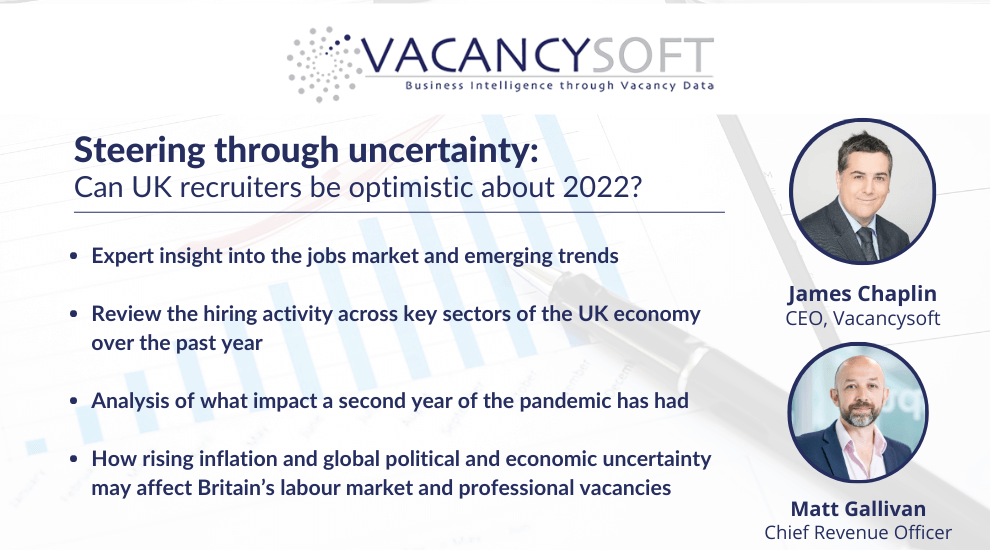
Steering through uncertainty: Can UK recruiters be optimistic about 2022?
As we are started the year 2022 we wanted to take time to look back to 2021, of what has been a frenetic year, with recruiters challenged in unique ways never seen before, the big question was: What next?
This free and exclusive virtual event gathered Britain’s recruitment industry leaders to discuss the following insights:
• Review the hiring activity across key sectors of the UK economy over the past year and present expert insight into the jobs market and emerging trends
• Analyse what impact a second year of the pandemic has had and look ahead to how rising inflation and global political and economic uncertainty may affect Britain’s labour market and professional vacancies.
James Chaplin, Vacancysoft CEO presenting, where attendees also had the opportunity to both network with each other and ask questions about the presentation directly.
Matt Gallivan, Chief Revenue Officer talks about tools that allow you to make data-driven decision making by analysing the market as to what is happening in your markets, whether that be by sector, location or by role. Vacancy Analytics gives you knowledge and data at your fingertips.
Agenda as follows:
12.00 doors open – introduction and short networking
12.05 20-minute presentation on market activity by James Chaplin
12.25 15-min Data-driven decision making in 2022
12.40 Annual Magazine launch
12.45 Q&A
13.00 Event ends
If you are responsible for business planning and strategy don’t miss this unique opportunity to get insights on the latest market activity and what it could mean for your business.
This webinar is useful to: Recruitment Firm Directors, Operational & Marketing Managers in Recruitment Firms, Corporate Recruiters, Managers in RPOs and MSPs. HR Managers.
Download our Year in Review Magazine 2021 edition below!
In our annual magazine 2021 edition you will find a full review of the hiring activities across key sectors of the UK economy over the past year. The magazine covers trends seen in Britain’s tech, life sciences, law, finance, real estate and insurance industries.
Alternatively, download our presentation slides below:

MedTech – UK Life Sciences Labour Market Trends, December 2024
The MedTech sector is slowly gathering steam again in the UK’s post-pandemic economy, and manufacturing is now being scaled up. For 2024 so far, the total number of vacancies has risen overall (both in scientific and non-scientific positions across MedTech).

A&F – UK Finance Labour Market Trends Report, December 2024
The accountancy job market in the UK has seen notable changes, with an overall drop in the number of vacancies nationwide. A closer look reveals that 59% of roles are based outside London, but these regions have experienced an 8.6% decline in vacancies.

London – UK Regional Labour Market Trends, December 2024
Recent political and economic developments in the UK have shaped the landscape for professional vacancies in 2024. Following the recent election, renewed government policies have focused on boosting key industries such as technology, financial services, and green energy.

Biotech – UK Life Sciences Labour Market Trends, November 2024
The UK biotechnology sector is undergoing significant change as 2024 ends, driven by increased corporate venture capital and private equity funding. This financial boost has spurred activity, with investments in startups and scaling initiatives creating new jobs despite lingering post-COVID challenges.

R&C – UK Finance Labour Market Trends Report, November 2024
The UK job market for Risk and Compliance roles is undergoing a significant transformation, with the fintech sector leading the charge. Risk and compliance vacancies within the banks are projected to experience a 17% drop in 2024 as banks focus on stabilisation in response to shifting market conditions.

Midlands – UK Regional Labour Market Trends, November 2024
The Midlands’ job market in 2024 mirrors the broader economic challenges facing the UK. Sluggish GDP growth and persistent inflation are influencing employment trends. While investment in infrastructure projects like HS2 supports Real Estate & Construction, Brexit and global market instability continue to impact export-focused sectors.

Northern England – UK Regional Labour Market Trends, October 2024
In the North East, the industrial and Engineering sector leads workforce growth, with a 22.4% year-on-year increase in vacancies, reaching nearly 1,197. This surge reflects rising investments in infrastructure and manufacturing, essential drivers of regional economic stability and development.

Switzerland – Life Sciences Labour Market Trends, October 2024
The Swiss life sciences industry, despite a challenging dip in job vacancies in 2023 (down by 31.4%), shows a robust rebound in 2024, with vacancies projected to rise by 24.1%. R&D roles have been notably active, reflecting global trends and a renewed push in innovation.

C&I – UK Finance Labour Market Trends Report, October 2024
New recruitment data reveals a significant shift in UK hiring trends, with regional distinctions and sector-specific demands emerging. Overall vacancies have risen by 3.6%, reaching approximately 237,187, with London leading the charge—a projected 14.4% increase in finance vacancies indicates a concentrated demand in the capital.

South – UK Regional Labour Market Trends, September 2024
With the Labour Party now in power, its policy framework is expected to drive significant changes in the economy and labour market. The construction industry is preparing for a housebuilding effort on a scale not seen in decades. In other sectors, the focus is on how business-friendly the new government will be.


